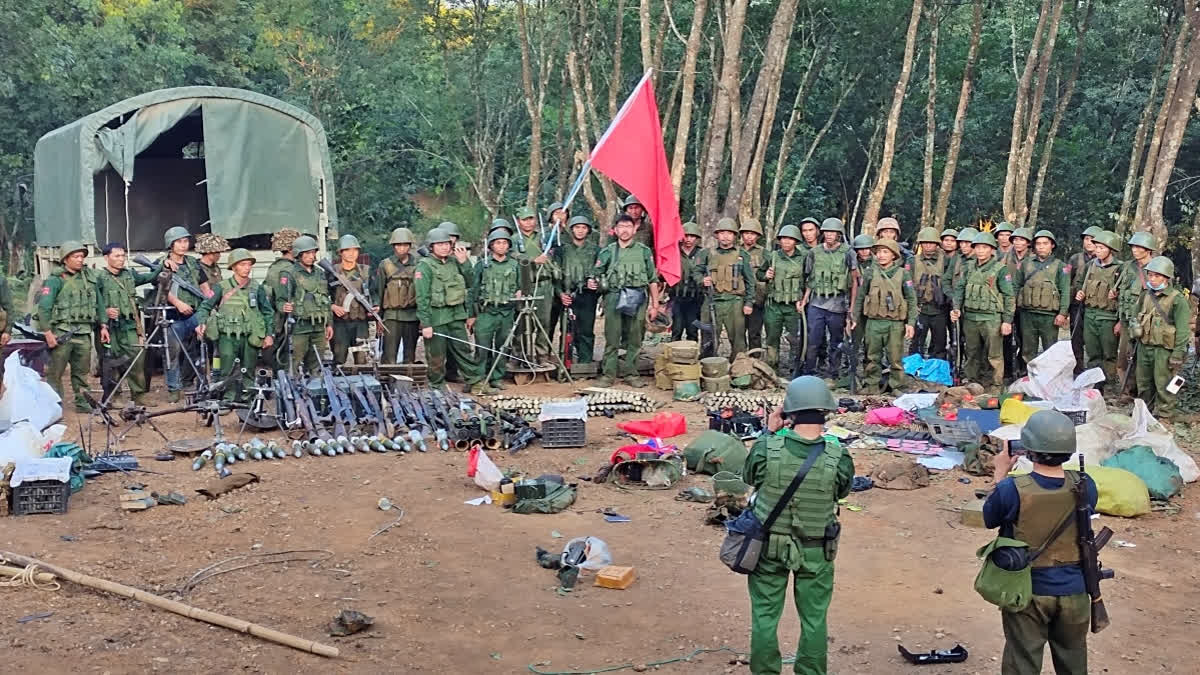New Delhi:In a stunning turn of events, Myanmar's resistance forces have dealt a significant blow to the military junta, capturing strategic bases in a daring display of defiance. The resilient opposition has managed to seize control of key military installations, marking a pivotal moment in the struggle against authoritarian rule. As the nation watches, the balance of power in Myanmar appears to be shifting, with the resistance forces demonstrating a newfound strength and determination in their quest for democracy.
On Monday, the Chin National Army reportedly captured a junta base in Reh Khaw Da, Falam Township, a hub for border trade with India. Chin State is a state in western Myanmar. It is bordered by Sagaing and Magway Divisions to the east, Rakhine State to the south, the Chittagong Division of Bangladesh to the west, and the Indian states of Mizoram to the west and Manipur to the north.
This is the latest blow the resistance forces in India’s eastern neighbour have delivered against the ruling military junta after the launch of Operation 1027 by the Three Brotherhood Alliance. Resistance forces have now seized border towns on both sides of the country after the launch of the offensive last month. The alliance, comprising the Myanmar National Democratic Alliance Army (MNDAA), Ta’ang National Liberation Army (TNLA) and the Arakan Army (AA), has seized dozens of townships in northern Shan State on the border with China.
“The resistance offensive has also spread to the upper Sagaing Region, where the Kachin Independence Army (KIA), AA and PDFs (People’s Defence Forces) seized the district-level town of Kawlin on November 6,” The Irrawaddy reported. “Elsewhere, Karenni resistance forces launched Operation 1107 in support of the offensive, attacking junta bases in Kayah State’s Loikaw and Mese and southern Shan’s Moebye town. Last Tuesday, the trade town of Khampat on the Indian border in Tamu Township was seized in a coordinated attack by the Chin Nationalities Defense Force, KIA and PDFs.” Tamu is on the other side of the Indian border town of Moreh in Manipur.
So, what is the Three Brotherhood Alliance?
The Three Brotherhood Alliance, also known as the Brotherhood Alliance, is an alliance between the AA, MNDAA, and the TNLA formed in June 2019. The group rose to prominence in 2023 in resisting the Myanmar junta in the wake of the 2021 Myanmar coup that ousted the country’s democratically elected President Aung Sang Suu Kyi. The three armed groups were silent about the coup initially but released a statement reaffirming the alliance's existence in March 2021. During the Myanmar civil war, the group fought mainly in Rakhine State and northern Shan State. On October 27, 2023, the alliance launched Operation 1027, an offensive against the junta in northern Shan state.
The AA is an ethnic armed organisation based in Rakhine State (Arakan). Founded on April 10, 2009, the AA is the military wing of the United League of Arakan (ULA). The MNDAA is an armed resistance group in the Kokang region. The army has existed since 1989, having been the first one to sign a ceasefire agreement with the then-Burmese government. The ceasefire lasted for about two decades.
The TNLA is the armed wing of the Palaung State Liberation Front (PSLF). The TNLA is known for its opposition to drug trade, conducting operations where they actively destroy poppy fields, heroin refineries and meth labs. The TNLA claims that it arrests opium smugglers regularly and the narcotics seized are publicly burned on special occasions to deter drug trade
What is Operation 1027?
Under Operation 1027, the joint forces launched simultaneous attacks in multiple towns in northern Shan State, targeting the Myanmar Army, the Myanmar Police Force, and pro-military militia installations in Kutkai, Kyaukme, Muse, Namhkam, Nawnghkio, Lashio, and Chinshwehaw. The rebels later expanded their offensive outside Shan State to the Sagaing Region, staging attacks in Mogok, Mandalay and Htigyaing, and capturing Kawlin. By the end of November 8, the Brotherhood Alliance claimed to have captured a total of 125 army outposts across the region. Other anti-junta groups in the country, such as the PDFs, pledged their support for and participation in the operation, conducting further attacks on the regime.
